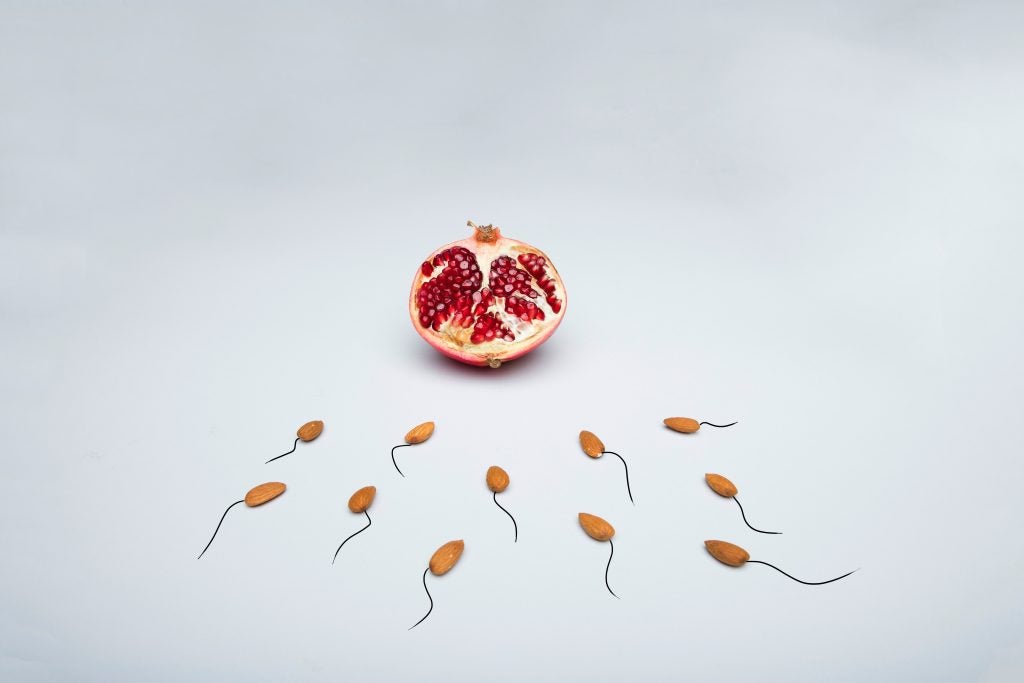
Some couples are able to get pregnant effortlessly, while others experience varying degrees of difficulty. Many couples who are trying to conceive are anxious to do so. Although having intercourse within the “fertile window” is one of the best known ways to increase the probability of fertilization, there are several other ways that couples can boost their fertility.
Table of Contents
Ways to Increase Her Fertility
Weight Control
Studies show that being over- or underweight can significantly affect a female’s ability to become pregnant. One study evaluated the body mass index (BMI) of 2,112 pregnant women whose pre-pregnancy BMIs ranged from 25 to 29. These women, considered overweight or obese, had twice as much difficulty getting pregnant compared to women whose pre-pregnancy weights fell within the normal BMI range of 18.5 to 24.9. Females with a BMI below the normal range have an even more difficult time getting pregnant than those who are overweight. The average time to conception for underweight females was four times longer than that for normal weight females. Slender females who vigorously work out five or more hours a week have been found to be 42% less likely to get pregnant than those who do not exercise as strenuously. It is important to exercise in moderation when trying to conceive.1-3
Healthy Diet
Closely related to maintaining a healthy weight is keeping a healthy diet. Women trying to conceive should avoid drinking an excess of coffee, alcohol, or soda.
Research indicates that drinking an excess of five cups of coffee per day is associated with increased difficulties of getting pregnant. Coffee in moderation, such as one to two cups a day, has not been linked to any negative effects on fertility.1-3
Studies on alcohol consumption and the ability to become pregnant have produced definitive results. A study conducted by Swedish researchers found that a woman who drank two or more alcoholic drinks per day decreased her fertility by nearly 60%.1 While two or more drinks per day has been linked to adverse effects on fertility, alcohol consumption in moderation is safe. Be advised that once you are pregnant, you should abstain completely from alcohol. Drinking while pregnant drastically increases the risk of serious birth defects.

Soda is another beverage that has been shown to affect a female’s ability to get pregnant. According to a 2012 study, women who drink two or more servings of soda per day have a 16% lower rate of fertility than women who do not drink soda. Reducing one’s soda intake can also significantly help with managing one’s weight.3,4
Other foods, such as soy or gluten, may also reduce a female’s ability to become pregnant. Soy acts like estrogen in the body and can make it difficult for sperm to swim to and fertilize the egg. A recent study by Columbia University suggests that gluten may be the cause of unexplained infertility in 6% of women who have celiac disease. The study’s author, Dr. Peter Green, states that women with celiac disease “produce antibodies that may interfere with the development of the placenta.” Study participants were able to conceive within one year after starting a gluten-free diet.2

Many experts believe that Bisphenol A (BPA), a chemical found in many plastics, may also affect women trying to conceive. BPA may be a “hormone mimicking” molecule that can disrupt a female’s hormonal balance and affect her fertility. Other harmful effects linked to BPA exposure include egg abnormalities and increased blood pressure levels, which raise a female’s chances of suffering a miscarriage. To avoid exposure, look for “BPA-free” labels on plastic products, especially those that come into contact with your food.2
Healthy Lifestyle
Each women’s lifestyle choice uniquely affect her ability to become pregnant. Research suggests that women undergoing in vitro fertilization (IVF) treatments see the best results when they are well rested. In vitro fertilization is a technique where the union of the sperm and the egg occurs in a laboratory, and the fertilized embryo is transferred into the uterus. IVF treatments were found to be most effective with females who consistently ot seven to eight hours of sleep per night.
Other aspects of healthy living, such as oral hygiene, have been associated with fertility. An Australian study (2011) showed that gum disease can add up to an extra two months to the time of conception when a couple is trying to get pregnant. Better brushing techniques and regular dental check-ups can help increase the odds of getting pregnant.
Get to Know Your Cycle
A good understanding of your body and menstrual cycle is important for knowing when you are most fertile. The “fertile window,” the period of time when a female is able to get pregnant, occurs on the day of ovulation and the five days prior. Females can learn to recognize signs of ovulation such as a one-sided twinge of pain in the pelvic region or a change in cervical mucus. Around the time of ovulation, the cervical mucus becomes thin, clearer, and more slippery. Cervical fluid that resembles the consistency of egg whites is typically a sign of ovulation, though every woman’s cervical fluid is different. Ovulation usually takes place on the day that a woman produces the highest volume of fluid.6
Pregnancy is most likely to occur around the time of ovulation. Women with 28 day cycles tend to ovulate on day 14, but many woman have longer or shorter cycles. A woman can also determine when she is ovulating naturally by using fertility awareness methods. Measuring the change in basal body temperature is one such method of natural fertility awareness. As a female approaches ovulation, her body temperature drops slightly then spikes once ovulation has occurred. By plotting her temperature over several menstrual cycles, a woman can determine when she ovulates.
Similarly a change in cervical position or firmness can indicate ovulation. The cervix changes during ovulation, and a female may notice her cervix becoming soft, high, open, and wet. For most women, it will take some time before they can differentiate between what their cervix feels like regularly compared to how it feels when they are ovulating.8 Taking advantage of the six-day “fertile window” (that ends on the day of ovulation) is one of the best ways for you and your partner to maximize your chances of pregnancy. The highest odds of pregnancy are on the third day of the “fertile window.”
Ways to Increase His Fertility

Females are not the only ones who can increase their fertility by making certain lifestyle choices and having healthy habits.
Sperm Count
According to Dale McClure, the president of the American Society of Reproductive Medicine (ASRM), the notion that boxers boost fertility over briefs by lowering testicular temperature is a myth. Recent studies have shown that the effects of underwear choice on sperm count are negligible. The ASRM also states that temperature does not significantly affect male fertility, but Mclures advises that a man who wants to be a father not keep a laptop on his lap for extended periods of time or take long, hot baths. At least one study has illustrated that repeated exposure to hot water in baths or hot tubs impacted sperm count. Some scientific literature has even linked the electromagnetic waves emitted by cellphones when stored in pants pockets to lower sperm counts. Be aware there are no definitive methods to increase sperm counts. It can take 10 to 11 weeks for lifestyle changes to affect sperm count, as this is how long it takes the testicles to produce sperm.1
Weight and physical activity have also been associated with male sexual health. According to a 2013 study, men who are overweight or obese generally have a lower total sperm count and concentration than men with a normal BMI. A Harvard study (2013) found that men who watched more than 20 hours of TV per week had a 44% lower sperm count than men who watched none.2
Men who do not exercise regularly have a 48% lower concentration of sperm in their ejaculate than men who exercise seven or more hours per week. If you are having difficulties conceiving, consider becoming more physically active and/or seeing reproductive specialist about your fertility.9
Couples Fertility Boosters
Quit Smoking

There are certain factors that affect both men and women’s ability to conceive. The ASRM reports that regular smoking leads to lower sperm counts in men and may damage sperm DNA. Smoking also affects female fertility by decreasing the receptiveness of the uterus to the conceptus. Experts strongly suggest quitting smoking before becoming or trying to become pregnant. Smoking while pregnant significantly boosts the risk of miscarriage and serious birth defects.
Have Frequent Sex
According to experts, having intercourse every other night around the time of ovulation gives couples the best chances of becoming pregnant.1 Although it would seem that daily intercourse would theoretically lead to the highest likelihood of pregnancy, research has shown that this frequency of sex may pose too much stress on a couple’s daily routine. Remember that sperm can survive inside the vagina for three to five days after intercourse, so daily sex is not necessarily the most effective method of pregnancy. The same study illustrated that intercourse every other day produced similar rates of pregnancy as daily intercourse.
You and your partner should engage in frequent sex when you are ovulating and when you are not. Some couples believe that they should “save up” sperm to increase their chances of pregnancy. However, after about a week in the testicles, the motility of sperm decreases even though the quantity may increase. Refraining from ejaculating for more than five days can decrease the motility of sperm.
While studies have not definitively proven that sexual position can affect fertilization, many experts believe that having sex in the missionary position and having the female lie on her back for 10-15 minutes after intercourse may increase the odds of getting pregnant. Some researchers speculate that placing a pillow under the female’s hips can increase the chances further because the position facilitates the flow of semen into the uterus.3 It is recommended that the female not use the bathroom during this interval for this method to be most effective. Unfortunately, there has been no scientific evidence to validate these claims.
Choose Lubricants Wisely
Many couples trying to conceive use vaginal lubricants due to the increased frequency of sex, but choice of lubricant may play a role in a couple’s ability to conceive. Canola oil, baby oil, and peanut oil are good lubricants when trying to become pregnant. Water based lubricants, such as Astroglide, KY Jelly, and Touch, may inhibit sperm motility from 60% to 100% because these lubricants may reach the upper vagina and prevent sperm from swimming into the cervix. Be sure to avoid products that contain spermicidal agents.1
Avoid Pesticides and Other Harmful Chemicals
Exposure to toxic agents and chemicals, including agricultural pesticides, may negatively affect both men’s and women’s fertility. The chemicals used in printing facilities and dry cleaning establishments are known to adversely affect fertility. Check the printed warnings posted at private and public establishments for the presence of these chemicals.
Avoid Stress
Stress can play a serious role in the lives of couples trying to conceive. Females can stop ovulating if their stress levels become too high. Although the biological mechanisms that cause stress to affect a female’s cycle are not known, stress has been linked to suppressed functionality of the hypothalamus in the brain. The hypothalamus, which controls the pituitary gland, in turn controls the thyroid and adrenal glands in the ovaries, which work together to manage hormone levels. Ovarian dysfunction may lead to problems with estrogen production, ovulation, and reproductive processes.8 Estrogen is crucial to preparing the uterine lining for pregnancy. If the ovaries are not properly functioning, the menstrual cycle may be affected, resulting in missed or irregular periods.8 Depression can play a similar role in suppressing fertility. By reducing stress a woman can do her best to regulate her cycle and determine when ovulation will occur. Stress has been shown to reduce sperm counts in men by similarly affecting their hypothalamus.
One way to avoid stress for both men and women it to have healthy levels of vitamin D. The vitamin D the body produces when it is exposed to the sun has been shown to be a natural mood booster and is involved in hormone production in both men and women. Additionally, vitamin D helps maintain proper levels of calcium. In females, this helps a baby develop healthy bones and teeth. Men and women trying to conceive should consider taking a dietary vitamin D supplement.
Additionally, women trying to get pregnant should consider taking folic acid and a daily prenatal vitamin. The Food and Drug Administration (FDA) recommends that women trying to conceive begin taking vitamin B preemptively to help protect against serious birth defects that may affect the development of the fetus’ brain and spinal column. Stress is one of the most influential factors for men and women trying to conceive; do your best to avoid stress when trying to become pregnant.
References:
1. http://www.webmd.com/baby/guide/8-ways-to-boost-your-fertility
2. http://www.health.com/health/gallery/0,,20783012_7,00.html
3. http://pregnancy.familyeducation.com/trying-to-conceive/slideshow/65736.html?page=5&detoured=1
4. http://www.webmd.com/baby/features/7-tips-getting-pregnant-faster?page=3
5. http://www.givf.com/fertility/ivf.shtml
6. http://americanpregnancy.org/getting-pregnant/signs-of-ovulation/
8. http://www.everydayhealth.com/pms/managing-stress-during-pms.aspx
Last Updated: 29 March 2015.
